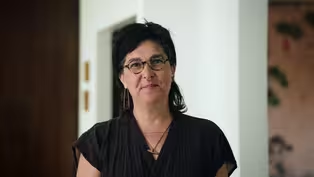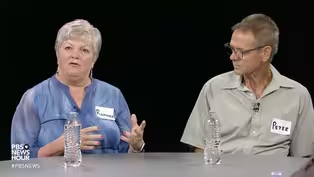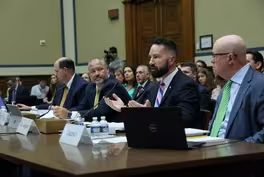
New book 'The Right Call' reveals life lessons from sports
Clip: 7/19/2023 | 8m 2sVideo has Closed Captions
New book 'The Right Call' reveals life lessons from sports
Elite athletes tend to hold a special place in America's imagination. It's almost as if sports stars are mythical figures capable of executing greatness at critical moments when stakes are high. But the book "The Right Call: What Sports Teach Us About Work and Life" debunks that and reveals the rest of us can learn a lot from the sports greats. Amna Nawaz discussed that with writer Sally Jenkins.
Problems playing video? | Closed Captioning Feedback
Problems playing video? | Closed Captioning Feedback
Major corporate funding for the PBS News Hour is provided by BDO, BNSF, Consumer Cellular, American Cruise Lines, and Raymond James. Funding for the PBS NewsHour Weekend is provided by...

New book 'The Right Call' reveals life lessons from sports
Clip: 7/19/2023 | 8m 2sVideo has Closed Captions
Elite athletes tend to hold a special place in America's imagination. It's almost as if sports stars are mythical figures capable of executing greatness at critical moments when stakes are high. But the book "The Right Call: What Sports Teach Us About Work and Life" debunks that and reveals the rest of us can learn a lot from the sports greats. Amna Nawaz discussed that with writer Sally Jenkins.
Problems playing video? | Closed Captioning Feedback
How to Watch PBS News Hour
PBS News Hour is available to stream on pbs.org and the free PBS App, available on iPhone, Apple TV, Android TV, Android smartphones, Amazon Fire TV, Amazon Fire Tablet, Roku, Samsung Smart TV, and Vizio.
Providing Support for PBS.org
Learn Moreabout PBS online sponsorshipGEOFF BENNETT: Elite athletes like Michael Phelps and Serena Williams tend to hold a special place in America's imagination.
It's almost as if such sports stars are mythical figures capable of executing greatness at critical moments when the stakes are high.
But a new book debunks that and reveals the rest of us can learn a lot from the sports greats too.
Amna Nawaz recently spoke with Sally Jenkins about her new book called "The Right Call: What Sports Teach Us About Work and Life."
Sally Jenkins, welcome back to the "NewsHour."
Thanks so much for joining us.
SALLY JENKINS, Author, "The Right Call: What Sports Teach Us About Work and Life": Thanks for having me.
AMNA NAWAZ: So, most of us, I think it's fair to say, are nothing like the elite athletes and coaches that you feature in this book.
But you write that there are lessons in their process for all of us.
Tell us about that.
SALLY JENKINS: Absolutely.
I think one of the things I have learned in all the years of covering these people is that they're just as flawed and insecure as the rest of us.
They just do a better job of sort of mitigating that and finding their weaknesses, facing them and curing them.
AMNA NAWAZ: You identify seven key elements in the book for anyone who wants to be able to, as you put it -- quote -- "act well in the face of extraordinary pressures."
Who among us doesn't want to?
Those seven elements you list are conditioning, practice, discipline, candor, culture, failure, and intention.
I want to start with practice, because that may seem obvious to many people, but you actually write there's a lot of bad practice out there.
What did you mean by that?
SALLY JENKINS: Well, there's a lot of purposeless activity, a lot of meaningless activity with no real measurable improvement.
All the people I talked to for the book, whether it was Peyton Manning, the Hall of Fame NFL quarterback, or Steve Kerr, the coach of the Golden State Warriors, they work with a purpose.
They diagnose a weakness and then they attack it.
Peyton Manning, for instance, early in his career had some unstable feet under pressure when heavy defensive linemen would dive below his knees.
So one of the things that his coaches did with him was, they started hurling heavy sandbags at his feet in practice to get him a little more stable under pressure.
Those are the sorts of granular things that athletes do to work on things that are really kind of marginal weaknesses, but make an incredible difference under pressure.
AMNA NAWAZ: Knowing and studying your own weaknesses too, that seemed to be a big part of competing at that elite level.
How does that apply to the rest of us?
SALLY JENKINS: Well, we all have a lot of unconscious incompetencies.
A Peyton Manning doesn't really know his feet are an issue until a coach like Tony Dungy gets ahold of him and says, you may have been a top draft pick and a future Hall of Famer, but right now you're a 32-32 quarterback in your won-loss record and you're leading the league in interceptions, despite all your talent.
So let's go fix that.
The rest of us, the same thing.
We have unconscious incompetencies.
We're not aware as we work through our own lives of where our weaknesses really are.
And it takes an evaluative eye.
And it also takes a certain amount of sort of personal courage to say, where am I not great?
AMNA NAWAZ: In the chapter on candor, you write about language, the difference between blame and critique.
You write -- quote -- "If you want to breed trust, you don't just tell someone what they did wrong.
You tell them how to do it right."
Who's a good example of that you have seen over the years?
SALLY JENKINS: Well, Pat Summitt was the greatest example I was ever around.
That's where I actually first got that insight.
I worked with Pat on some books and hung around her program at the University of Tennessee quite a bit observing.
And it was really, really striking.
Pat was known as a very demanding coach, as a very disciplined coach and fierce.
But I never heard her criticize a player without immediately offering the fix.
And it bred a great deal of trust.
She could then -- she could yell at players because they knew she was going to offer the solution in the next breath.
AMNA NAWAZ: There's a powerful line from Pat Summitt you have quoted that really resonated with me.
She said: "No one cares how much until they know how much you care."
How did that show up in her leadership?
SALLY JENKINS: Well, followers -- it turns out that teams actually have a lot more power than the coaches or the leaders.
I have seen countless teams take their coaches down by rebelling quietly.
Quiet mutinies in a locker room is something you see quite a lot in sportswriting.
You know it when you see it.
And Pat Riley, the president of the Miami Heat, has a really great description of what happens when followers don't trust the intentions of their leaders.
They start doing what Riley called subtly gearing down their efforts and enrolling others in their own cycles of disappointment.
AMNA NAWAZ: Sally, you write a lot about organizational culture and success.
We are speaking amid a lot of turmoil in the golf world, with the PGA Tour partnering with that Saudi-funded LIV Tour.
It's under a lot of scrutiny.
Should that deal have happened?
SALLY JENKINS: It's an essay in some of the worst leadership I have ever seen.
The hallmarks of really bad leadership are secrecy, lack of transparency, lack of preparation.
All of those things, the PGA Tour was guilty of.
They announced this deal without consulting anybody on the policy board of directors or any of their players, and their constituency has just absolutely rebelled.
The secrecy led to inquiry from everyone from Senator Richard Blumenthal and his committee to the Department of Justice.
I mean, there's just fallout after fallout here, because they violated some pretty basic principles of good organizational leadership.
AMNA NAWAZ: Sally, while I have you, I have to ask you about an incredibly powerful piece you wrote recently, a joint profile of two tennis greats, Chris Evert and Martina Navratilova, not only the fiercest of rivals, but also the closest of friends for decades.
Both ended up battling cancer at the same time.
I want to play just a part of your interview with them.
CHRIS EVERT, Former Professional Tennis Player: Yes, and we went through the -- pretty much the same things in life.
MARTINA NAVRATILOVA, Former Professional Tennis Player: The trajectory, it's amazing, really.
CHRIS EVERT: And we're going through this together, which is like -- I love the phrase know we're in the trenches together.
Like, we have been in the trenches together our whole life.
AMNA NAWAZ: Sally, this was a sports story, but it really wasn't.
Why do you think it resonated so much with so many people?
SALLY JENKINS: Well, I think that, first of all, the reconciliation between the two of them after this epic ride rivalry is just -- it's very touching.
There's something moving about the fact that you can be the greatest opponents in the world and somehow emerge from that friends.
I think there's a real craving for sort of more gentle relationships in the world right now.
So I think that resonated.
Cancer is certainly such a common experience for Americans.
And, frankly, a lot of people grew up with these two women.
They were revolutionaries.
They established, as Chris Evert so beautifully put it, the right of women, the permission for women to really compete all out.
So they resonate with people in, I think, probably five or six different faceted ways.
And all of that came together in the perfect storm of this story about their friendship.
AMNA NAWAZ: Sally, it strikes me no one could have written that story but you.
You have covered them for so long.
You have covered all the greats in your book for so long.
What's it like to look back on that and think about that front-row seat to sports history you have had?
SALLY JENKINS: Well, that's partly why I wrote the book.
I -- it's -- the book is really, in some ways, a letter of appreciation to people like Chris Evert and Martina Navratilova, who I started covering in 1984, when I was a very young writer.
I was about 24 years old, 25 years old.
They were just such great examples of how to go about your business, how to strive to be truly great at something.
I was very lucky to be exposed to them early.
I have been very lucky to have a front-row seat, and I have taken notes.
(LAUGHTER) SALLY JENKINS: So this is my offering from my notebook.
AMNA NAWAZ: The book is "The Right Call: What Sports Teach Us About Work and Life."
The author is Sally Jenkins.
Sally, great to speak with you.
Thank you.
SALLY JENKINS: Thank you so much.
Brief But Spectacular take on using craft to fight injustice
Video has Closed Captions
Clip: 7/19/2023 | 2m 59s | A Brief But Spectacular take on using craft to push back on injustice (2m 59s)
Germany's role as economic powerhouse at tipping point
Video has Closed Captions
Clip: 7/19/2023 | 8m 26s | Germany's role as economic powerhouse at tipping point amid recession (8m 26s)
Iowa Republicans on hopes for overcoming divisions
Video has Closed Captions
Clip: 7/19/2023 | 11m 17s | Iowa Republicans discuss role of politics in their lives, hopes for overcoming divisions (11m 17s)
Jurors weigh death penalty for Pittsburgh synagogue killer
Video has Closed Captions
Clip: 7/19/2023 | 6m 17s | Jurors weigh death penalty or life in prison for Pittsburgh synagogue killer (6m 17s)
Trump to massively expand power if elected, report says
Video has Closed Captions
Clip: 7/19/2023 | 5m 53s | Trump plans to massively expand executive power if elected, report says (5m 53s)
Whistleblowers claim DOJ meddled in Hunter Biden case
Video has Closed Captions
Clip: 7/19/2023 | 5m 15s | IRS whistleblowers claim Justice Department meddled in Hunter Biden investigation (5m 15s)
Providing Support for PBS.org
Learn Moreabout PBS online sponsorship
- News and Public Affairs

FRONTLINE is investigative journalism that questions, explains and changes our world.

- News and Public Affairs

Amanpour and Company features conversations with leaders and decision makers.












Support for PBS provided by:
Major corporate funding for the PBS News Hour is provided by BDO, BNSF, Consumer Cellular, American Cruise Lines, and Raymond James. Funding for the PBS NewsHour Weekend is provided by...





